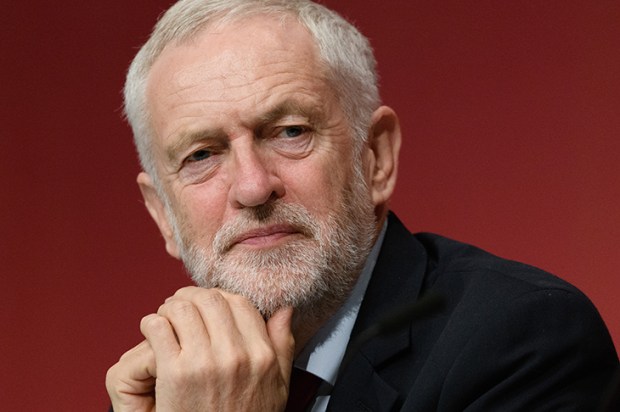‘Why don’t you just join the Liberal Democrats?’ If I’ve heard that once in the past couple of years I’ve heard it a hundred times. In online posts beneath my Times column, in public debates or private conversations, the question is sometimes a genuinely puzzled enquiry but more often an implied: ‘What the hell are you doing posing as a Tory?’
It’s all about Brexit, of course: the questioner’s assumption being that, strip from a Conservative the ambition that Britain should leave the European Union, and there remains nothing important to distinguish him or her from a Liberal Democrat. The assumption is part of the poisonous modern heresy that leaving the EU is so much the biggest issue of our day that little else — the survival of the Union, the state of our national finances, the avoidance of economic recession — matters. I know Leavers who, assured that Brexit depended on it, would give sympathetic attention to proposals for the Slaughter of the First-Born.
The heresy that Brexit is the only question suits the Lib Dems because, there being many more Remain voters than (so far) Lib Dem voters, the party has much to gain from converting the former into the latter. But to lend a party your support in the polling booth does not make you one of them. On TV I watched bits of the Lib Dem conference in Bournemouth this month, agreed with a good deal being said, and thought Jo Swinson more impressive than I’d supposed; but had no more of a feeling than I’ve ever had of being one of them.
But why? Is it just the unfamiliarity of a new crowd that keeps me — however ‘liberal’ — a Conservative still? No. I’ve been working on what you might call a liberal Conservative creed. It’s personal, of course, and fellow Lib-Cons will each have their own version, but here’s mine, framed to identify important areas of difference between my party’s instincts and what I’ve observed to be the instincts of modern Liberal Democrats.
I believe in the dangers of moral hazard. The precautionary instinct, and a sense of the link between behaviour and outcome, are the lifeblood of personal development. In its mission to protect citizens, government must not weaken these instincts. It follows that…
I believe in inequality. People should be allowed to succeed or fail. To cushion those who stumble and to temper human greed, good government must take from the rich to help the poor and narrow the gap; but the exhibition in daily life of the rewards of hard work and talent, and the consequences of indolence or foolishness, is necessary to the progress of a race or nation. Nevertheless…
I believe in good and bad luck. Success or failure are often undeserved, hence the need to tax the first and cushion the second. But the fickleness of fate is part of life, of its spice, of its meaning. It should not be a function of government to jam the wheel of fortune. We take a restrictive view of the role of government to reverse the fortunes of both the undeserving and the unlucky.
I believe in choice. A liberal Conservative is on guard against the pressure in government to force upon people the life choices they ought ideally to make, the ways they ought to be, to think, speak, act and live. We know the argument for coercion may sometimes be right; know people do sometimes need shepherding; but remember we are not sheep; and meet with scepticism proposals to impose virtue.
I believe in business. Conservatism is nothing without a driving sense of the duty of politics to encourage the generation of wealth; and we believe economic liberalism is the best motor for prosperity. This should not exclude interference by government to sharpen competition, punish greed and protect consumers, but even when the rough and tumble of the marketplace offends us, the vigour of markets should never be far from a liberal Conservative’s priorities.
I believe in resistance to the growth of state spending and state control. Liberal Conservatives know the modern state must spend enormous sums. But we’re conscious of an underlying drift, like an ocean current, for government to take on new tasks and spend ever more in accomplishing them. We reject in our bones the growth in the reach of government into citizens’ lives. We feel a duty to swim against the current, greeting every new proposal not with unthinking resistance, but with fierce, intelligent scepticism. A liberal Conservative saw in ‘austerity’ more than an emergency response to an economic crisis, but a useful pushing back against the creep of state spending, too.
I believe in the virtue of certainty in public administration. To maintain consistency, politicians must often harden their hearts. One newsworthy flooding of a housing estate should not advantage a householder who didn’t insure, as against one who did. But in a story-driven news media, public opinion is easily tugged towards remedying individual, sometimes sensational, examples of misfortune or injustice at the expense of general rules in which people need to feel confidence if they are to plan their lives. Knee-jerk political responses to human dramas confuse settled principles. A liberal Conservative does not deny the importance of compassion in governance; but knows that hard cases make bad politics.
I believe in the nation state. Liberal Conservatives are internationalists and know nations must often pool sovereignty and submit to rules-based international order. We believe in alliances and accept the impositions they bring, keeping in mind how alliances add to our security and help us spread our own ideas and standards. We don’t regard autonomy as sacrosanct in every circumstance. But love of country, the defence of country and the preciousness of shared identity remain at the centre of our ideals for government. We are not sheepish about that.
When Brexit is over, these are among the differences with socialists and social democrats that will return to define our national political debates. I take the long view, and am not jumping ship.
Got something to add? Join the discussion and comment below.
Get 10 issues for just $10
Subscribe to The Spectator Australia today for the next 10 magazine issues, plus full online access, for just $10.
You might disagree with half of it, but you’ll enjoy reading all of it. Try your first month for free, then just $2 a week for the remainder of your first year.















Comments
Don't miss out
Join the conversation with other Spectator Australia readers. Subscribe to leave a comment.
SUBSCRIBEAlready a subscriber? Log in